As an early Generation X’er (1965) with Attention Deficit Hyperactivity Disorder (ADHD), this basically meant I didn’t know I had ADHD. By my teenage years I had a background awareness that something was up; I struggled to stay on track at a decent school (though maybe not one suited to left field people) and couldn’t understand why, I often couldn’t focus when someone was talking to me and I started sliding into addictive behaviours to quell the anxiety caused by the condition. I still don’t really know if not knowing was a good thing or not. The positives of not knowing are that I just had to progressively work out how to regulate myself to prevent my chaotic life completely unravelling (despite the messy ride being exciting at times); the negatives are that I can’t help wondering if I couldn’t have been saved from a lot of needless suffering and mayhem if I’d known? Or where I would be now if I’d had support? There is no question that for me my life choices and outcomes have been defined by this condition.
Continue reading “ADHD Aged 60. How it Started , How it’s Going ..”Category: Health, Fitness and Wellbeing
Health and Wellbeing
The sustainable path to health and longevity (expensive quick fixes not included).
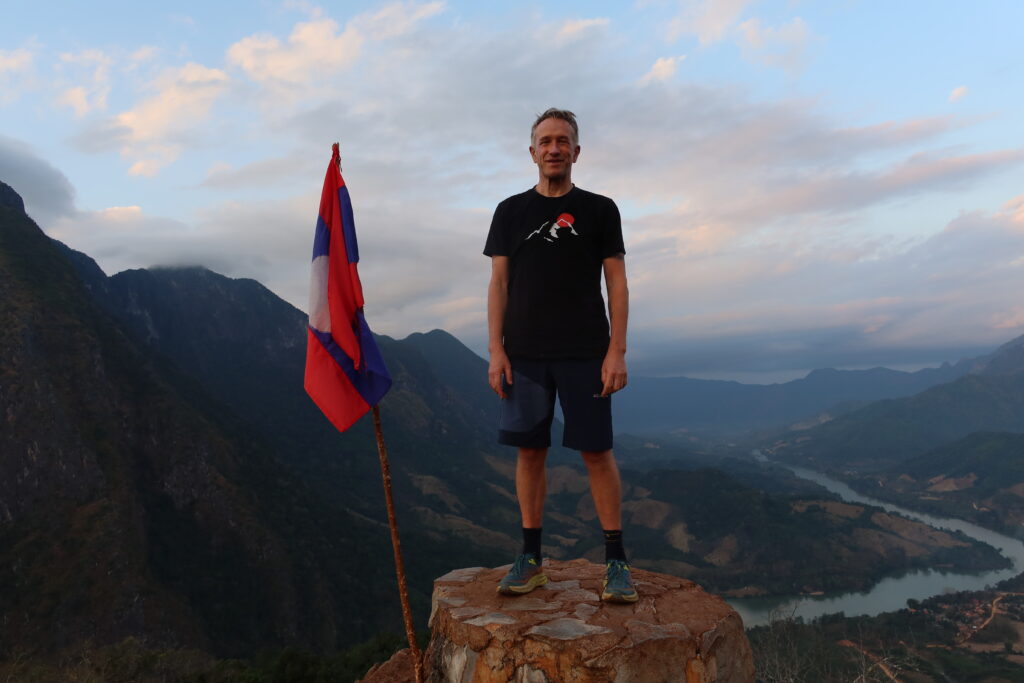
There are a lot of unrealistic ideas out there promising this or that life enhancing elixir or quick fix and then, hey, your life and health and or looks will be somehow optimised. Biotechnology may offer some amazing potential treatments to come, but is not without risks to people and nature, much of it is not here yet and some of what it promises may offer unrealistic hope. Pharmaceutical products and natural seeming tonics and supplements are also potentially a mixed bag of outcomes where it’s hard to distinguish between genuine efficacy and placebo effect (even though that is an efficacy). Beyond that, questionable expensive surgical enhancements may tempt people in the hope of looking and feeling better. Commercial interests underpinning all of these products also muddy the waters of the truth of what may really help us feel good and live well.
Staying well and working with what we have is to my mind our best and most affordable option . With a little thought and effort anyone willing to learn to live in alignment with principles that work for them, and be consistent with that approach, can experience positive change in health status and even reversal of some health issues.
Flux and renewal are at the heart of life processes; biologically and neurologically we are constantly regenerating and resetting in response to our environment even as we age. This is cause for optimism; life is malleable. Cellular renewal occurs at all ages and the brain and nervous system are constantly rewiring and restructuring in response to our environment. Positive change is always possible and to a fair degree in our hands. How we live hugely influences how we feel and how life goes for us so some basic understanding of how these processes work can empower us to live long, healthy and well.
Continue reading “The sustainable path to health and longevity (expensive quick fixes not included).”The Largest Table Tennis Tournament in the World (Ever).
The ITTF (International Table Tennis Federation) World Masters Table Tennis Championships took place this year (2024) in July in Rome, Italy. At 6,ooo competitiors competing in five year age groups from over 40’s to to over 90’s, it was the largest table tennis competiton ever held. The range was huge, from current professional players such as Joao Montiero, Portuguese 40+ age group gold medallist and still ranked in the top 100 in the world, through to Betty Bird a British 90+ gold medallist, along with 5,998 others; including my somewhat overambitious self chasing ping pong glory rainbows at the age of 58.
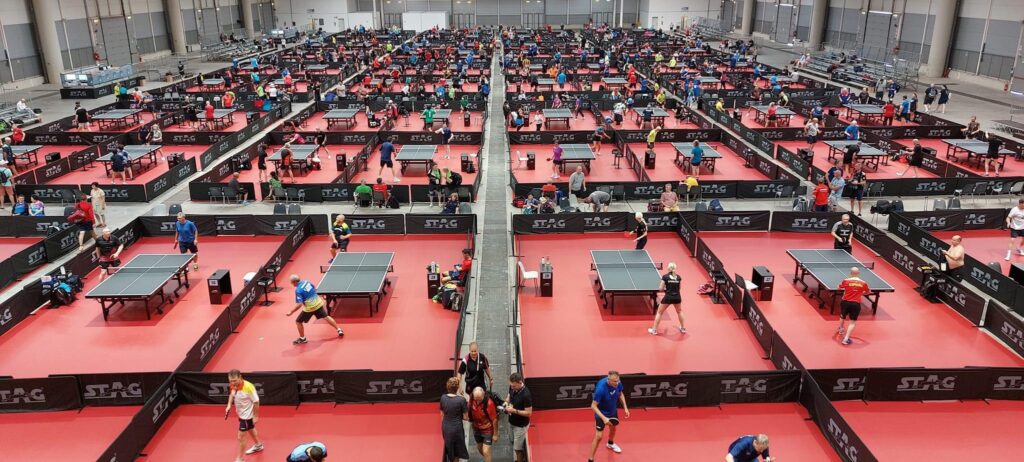
How does tension collect in the body ? How is it affecting us? What can we do about it?
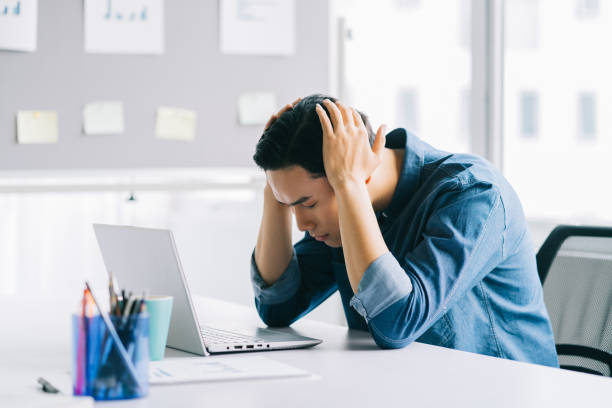
Part of my job as a massage therapist is to help people lose tension held in the body, this in itself can leave some people looking transformed. Sometimes it is recently accumulated tension, relieved by letting go and relaxing; sometimes it is older more chronic tension, more solidified in bodily tissues that needed a more active intervention, sometimes something of both. Either way, releasing tension is good for us and holding tension in the body is not for a variety of reasons:
- It feels unpleasant.
- we feel contracted and tight.
- It can restrict breathing.
- Muscles feel gripped.
- It can constrict blood flow though vessels, tissues and organs.
- It can be at the seat of some body pain.
- It can steal our energy (it takes energy to hold tension).
- It can leave us anxious or depressed (though that is a chicken and egg story).
- Chronic tension and stress can have more pernicious effects on our physiology which can damage our health ( a longer story beyond the scope of this article).
Here are some suggestions around what causes it and how we can learn to handle it.
Continue reading “How does tension collect in the body ? How is it affecting us? What can we do about it?”A Very (Very) Short Introduction to the History and Philosophy of Yoga
Is Yoga a practice or a philosophy?
At its heart Yoga is an experiential practice with its origins embedded in Indian Hindu/Buddhist culture. But, I personally know a wide diversity of people who identify as variously as Hindu, Humanist/Atheist, Buddhist, Christian and Muslim who have adopted Yoga’s core practices of asanas (postures), pranayama (breath practices) and meditation as they perceive them as compatible with their beliefs/reasoning and provide practice based experiential support to explore their worldviews or their health. This suggests to me that Yoga is primarily a practice/experiential based system that can help and support people from any number of backgrounds and cultures.
That said there is an underpinning philosophy (arguably universal beyond Yoga) which in simple form looks like this: we experience suffering and disharmony to varying degrees because we view life and relationships through the murky lens of our family and societal conditioning and potentially inherited tendencies ( whether viewed as genetic or karmic or a combination of both). Yoga practices help us unpick and cut through these knots of conditioning so we can wipe the lens clean, ‘see’ clearly, and so live in harmony and peace with ourselves and others.
In essence philosophy gives us an approximate map to work from and reflect on, whilst practice and life is the actual territory.
Yoga in Chiang Mai, and how I got from practicing Gentle Yoga to Vinyasa Flow Yoga over 30 Years.
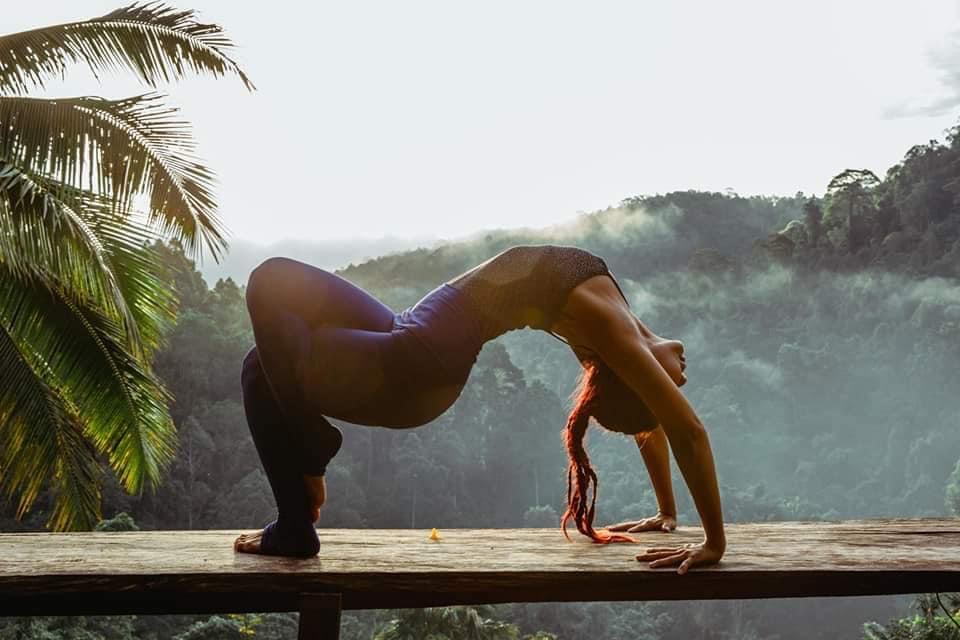
I’ve been practicing yoga for more than 30 years and have explored much of the full spectrum of practices available in that time. My development in practices of the asanas has in many ways been the wrong way round (compared to many people), moving from gentler slower forms of practice in my 30’s to more dynamic vinyasa flow practices as I’ve moved into my middle 50’s . Practicing in Chiang Mai in recent years, and with one teacher in particular, has been a big part of the reason for this.
Continue reading “Yoga in Chiang Mai, and how I got from practicing Gentle Yoga to Vinyasa Flow Yoga over 30 Years.”Muay Thai. A brief experience in Chiang Mai, Thailand.
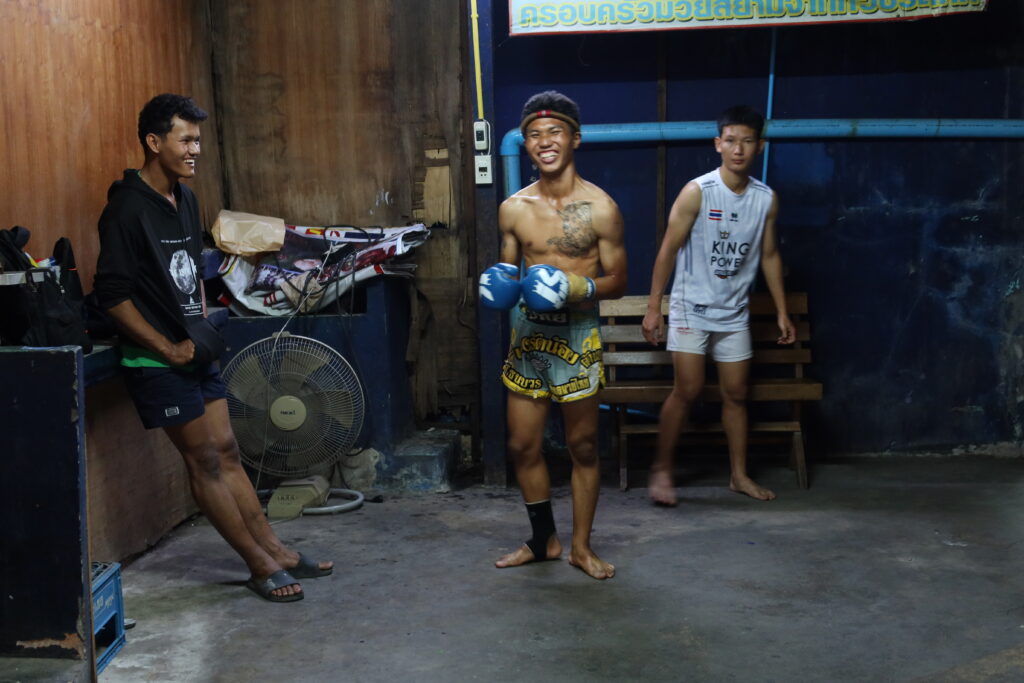
The one previous Muay Thai fight I had seen was in Bangkok at the old Lumphini stadium sometime in the 1990’s . I was in my 20’s, somewhat hippyfied and not too interested in the idea of seeing it; but two women from Leeds (UK) in my hostel said ‘we luv a good fight, cum with us, you’ll luv it’ . Inside the old three tiered stadium I did kind of enjoy it in a watching gladiators in a bear pit sort of way, though a sharp knee to the head knock out did cause me to wince a bit. I thought nothing more of it until my youngest son aged 19 started training in it four times a week in the UK . Of all the things to choose, not really what I had in mind for my small cuddly child when he was younger. So while in Thailand his interest led me to investigate a bit more at Chiang Mai gyms and at the Tha Phae Stadium in Chiang Mai.
Continue reading “Muay Thai. A brief experience in Chiang Mai, Thailand.”Massage Culture in Thailand.
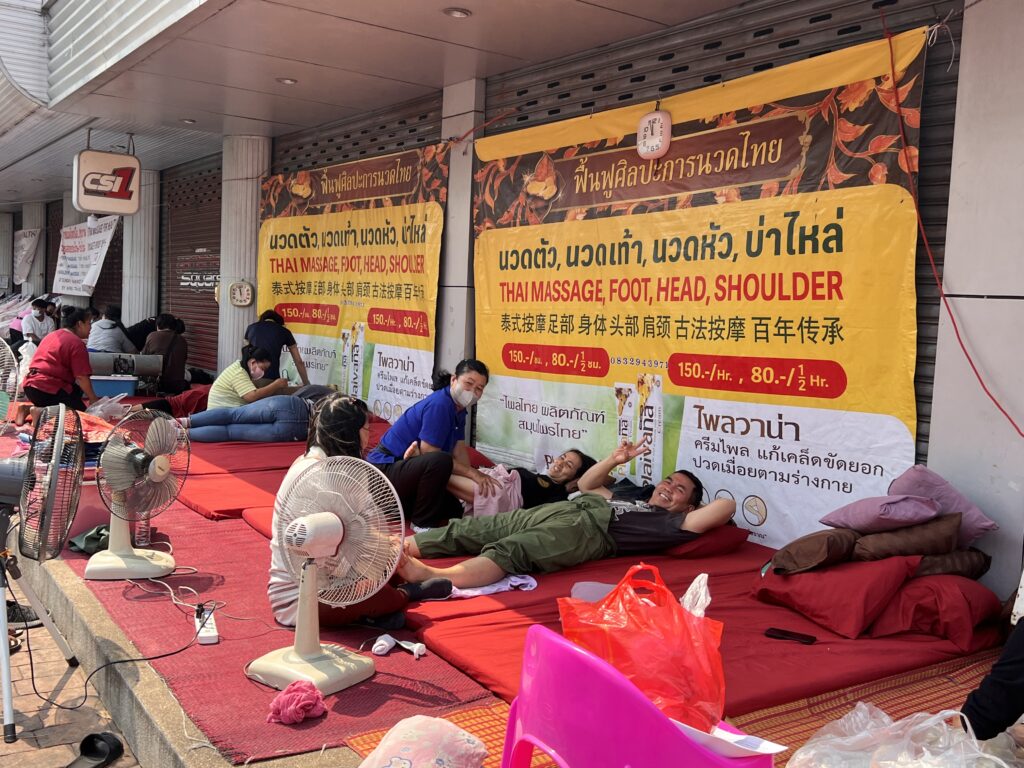
Massage is very much part of day to day life in Thailand . Often it is not segregated away into sanitised clinics and spas (but those places exist) . It is both part of popular culture and a serious medical treatment . Traditionally children massage parents (bring it on) and it’s not uncommon just to see people getting stuck into each other’s knots and blocks in less formal work settings and markets. At the airport when leaving I saw one of the cleaners going over one of his colleagues, including standing on him, just on the floor outside the loos . Whilst on my research and study trips I made it my business to receive massage in as many and varied places as possible.
Continue reading “Massage Culture in Thailand.”Learning Thai massage over 25 years, my experience.
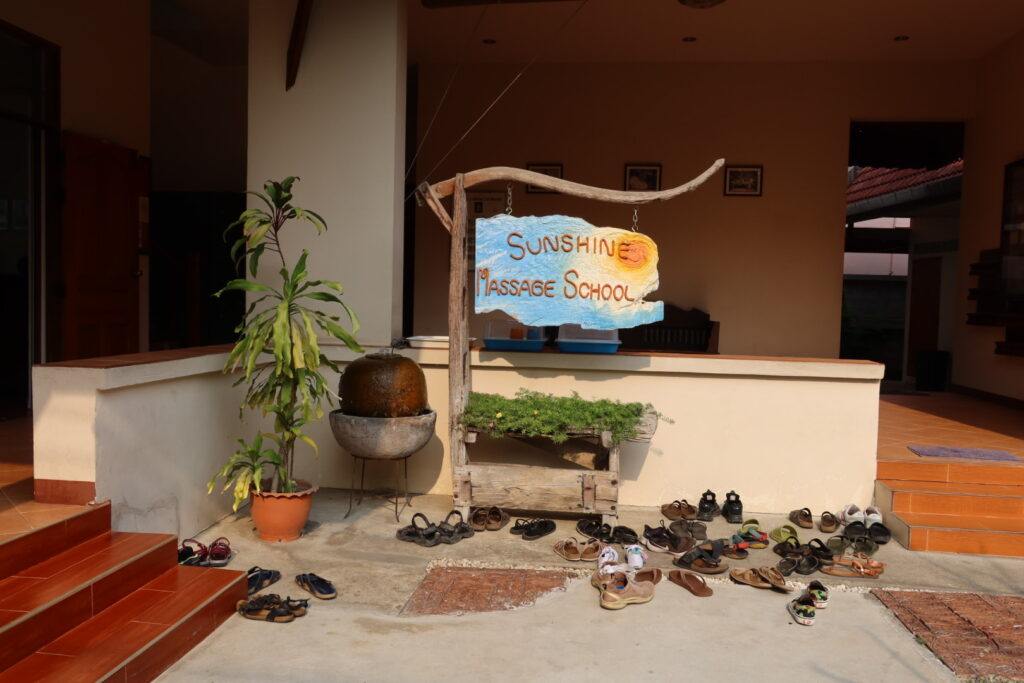
In my late 20’s my initial simple desire was to learn Thai massage as it was the best massage I had received, and it fitted with my developing career path in Yoga at that time. Perhaps naively I thought I would do a couple of courses and off I would go. I wasn’t really expecting to embark on an amazing adventure of lifelong learning , with lots of confusion along the way and to become immersed in another culture and worldview ; but I’m grateful I chose this route, am all the richer for it, and hopefully my clients appreciate it too.
Continue reading “Learning Thai massage over 25 years, my experience.”Meditation and its Philosophy in Plain English.
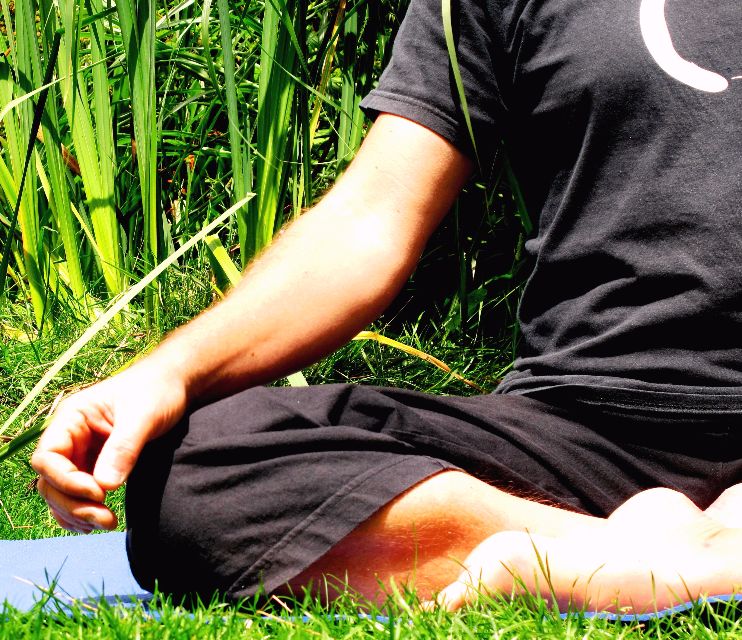
Meditation is a nuanced subject and practice, but there are some core elements common to most traditions . This guide reflects my own experience in the Buddhist/Yoga tradition and the most useful ideas that I have worked with. I do though feel it is not necessary to be allied to a tradition or religion to explore meditation, especially for those of use inclined towards humanism and a secular approach to exploring these matters. The framework and container provided by a tradition or religion maybe well be helpful , especially to get started ( they often have a lot of centuries of practice behind them) , but it may equally be helpful to keep a neutral open minded position to avoid pre-conceived notions on experience and confirmation biases.
Continue reading “Meditation and its Philosophy in Plain English.”